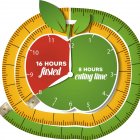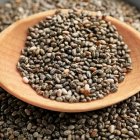Related articles
-
 How to Increase Weight: Foods to Include in Your Diet for Your Weight Gain Journey + Tips for Gaining Weight (2020)
How to Increase Weight: Foods to Include in Your Diet for Your Weight Gain Journey + Tips for Gaining Weight (2020)
-
 Want to Drop Weight Fast? Here are 5 Proven Intermittent Fasting Weight Loss Diet Pattern to Lose Weight and Reap the Long Term Benefits of Being Happier and Healthier (2020)
Want to Drop Weight Fast? Here are 5 Proven Intermittent Fasting Weight Loss Diet Pattern to Lose Weight and Reap the Long Term Benefits of Being Happier and Healthier (2020)
-
 Learn How You Can Use Flax Seeds in Different Easy Ways to Lose Weight(2021)!
Learn How You Can Use Flax Seeds in Different Easy Ways to Lose Weight(2021)!
Risks of Being Underweight: Having Optimum Weight is Important!
While a large share of the world population is fighting obesity, there is a group that wants to gain few kilos, the underweight lot. Being underweight not only impacts your personality and confidence but can also lead to serious health complications.
The major risk factors include:
- Malnutrition, anemia, or deficiency of vitamins resulting in low energy levels and feeling tired all the time
- Low immune power which makes you prone to flu and other viral infections
- Lack of vitamin D and calcium leading to osteoporosis and increased risk of low bone mineral density (BMD)
- Higher risk of developing complications after surgery and longer time to heal wounds
- Growth issues in children and teenagers that can lead to general and mental health.
- Irregular menstrual cycles in women leading to fertility issues and premature births
Underweight people have a higher mortality rate as compared to people who have a normal weight. An underweight person may also meet with skin, hair, and oral problems due to the inability to get enough nutrients from their diet.
Causes and Symptoms of Being Underweight
Someone with a BMI which is 15 – 20% below the average BMI (body mass index) is considered underweight. BMI is an international standard used to determine if a person is underweight, has a normal weight, or is obese. You can calculate your BMI at home using the simple formula for Metric BMI.
You can calculate your BMI at home using the simple formula for Metric BMI.
- Formula - weight (kg) / [height (m)]2
- Example – weight = 65 kg, height = 165 cm (1.65m)
- BMI calculation: 65 / (1.65)2 = 23.87
And then you can check if you fall in the underweight category as per below mentioned BMI scores
- 18.5 or less: Underweight
- 18.5 to 24.9: Normal Weight
- 25.0 to 29.9: Overweight
- 30.0 or higher: Obese
So now you know that if your BMI is below 18.5, then you are underweight. There can be various reasons for being underweight which include – medication for an ailment or condition which is suppressing your appetite or causing weight loss, excessive exercise without proper diet, extreme stress, enzyme deficiencies of digestive enzymes may also obstruct digestion resulting in weight loss and few medical conditions like coeliac disease and cystic fibrosis, etc, are also responsible for weight loss.
Few common symptoms of being underweight are – dizziness or fatigue due to anemia, hair loss, weak bones, poor mental and physical growth in children, irregular periods in women, or problems in getting pregnant and fragile immunity. Moreover, pale face and veins seeing through your skin are the other physically visible symptoms.
How to Gain Weight in a Healthy Manner - Top Tips That You can Use
There are various commercial supplements and dietary proteins that claim to increase weight quickly, but they may have side-effects due to the chemical content induced in them. Similarly, binge eating fast food can help you to put on a few kilos, but mostly around your waist, which is not a very healthy way to gain weight. As an underweight person, you should be gaining weight with a balance of muscle mass and fat evenly distributed across your body instead of amassing belly fat. Let’s explore a few healthy ways to gain weight without compromising your health.
Eat More Colories than You Burn
Make an estimate of how many calories you intake every day and how much you burn daily (you can take the help of a smartwatch to keep a track of the calories you burn every day) based on your current diet and activity level. Aim to consume 400 – 500 calories more than what you burn in a day, for faster weight gain, you can target for around 800 – 1000 calories above your calorie-burning capacity every day. You can take the help of various apps for counting the calories you consume and burn on daily basis, though they give an approximate estimate and you need to check your weight after a week or so to see the actual results.
Consume Plenty of Protein
Protein is considered the most important nutrient to gain healthy mass as muscles are made of protein and by increasing your protein intake you gain muscle weight instead of the unhealthy fat. So while you indulge in some overeating, ensure that most of it are protein so that the major part of the extra calories transforms into muscle. For gaining weight, you should target 1.5 – 2 grams of protein per kg of body weight. High protein foods include eggs, meat, chicken, fish, dairy products, nuts, legumes, pulses, and soya chunks, etc.
Eat More Carbs and Fat
While you’re trying to gain weight, try to eat at least 3 times a day and increase the intake of foods with high fat and carbohydrates. Your meals should have a mix of protein, fat, and high-carb foods to help your weight gain spree. Make sure to eat consistently and avoid intermittent fasting as it may disturb the set metabolism.
Include High Energy Foods in Your Diet
Lifting heavy weights is helpful in the muscle building as your muscles do the extra work to make sure that the excess calories are absorbed within them and do not build excess fat in the body. If you are firm upon putting on some weight then hit the gym right away, consult the trainer and start increasing the weights in your workout. Visit the gym a minimum of 3 to 5 times in a week to get the optimum results out of your workout and simultaneously increase the protein intake as well. Don’t forget to add a little bit of cardio along with lifting heavy weights to get the required stamina. If you have any medical condition, then do consult your physician before joining the health club.
Do Weight Training and Focus on Strength Building
There are various commercial supplements and dietary proteins that claim to increase weight quickly, but they may have side-effects due to the chemical content induced in them. Similarly, binge eating fast food can help you to put on a few kilos, but mostly around your waist, which is not a very healthy way to gain weight. As an underweight person, you should be gaining weight with a balance of muscle mass and fat evenly distributed across your body instead of amassing belly fat. Let’s explore a few healthy ways to gain weight without compromising your health.
Weight Gain Healthy Recipes
Now let’s check a few healthy recipes which are useful for weight gain. You can include these food items in your daily diet plan and get benefitted in your weight gain plan.
Palak Paneer
Spinach is packed with iron and paneer is rich in protein, hence this vital combination can do wonders for your health. The ingredients required for making Palak Paneer are - 350 grams spinach, 200 grams paneer (cut into cubes), 5 large garlic cloves (3 whole and 2 finely chopped), 1 medium tomato, 1 green chili, 1-inch piece of ginger, 1 large onion (finely chopped), 1 tsp garam masala, ¼ tsp red chili powder, ¼ tsp turmeric powder, ½ tbsp kasoori methi, 3 tbsp thick cream, ½ lemon juice, ½ cup water, 1 tbsp oil and salt as per taste.
Sprout Salad
An easy to make, tasty and healthy recipe, moong dal sprouts salad can be taken as a side dish with lunch or as a breakfast as well. You would require 2 cups of sprouted moong beans, 1 medium size tomato (finely chopped), 1 medium-sized onion (finely chopped), 1 green chilli (finely chopped), 1 teaspoon chat masala, 1 boiled potato (finely chopped), black salt as required, lemon juice and 2 teaspoonful coriander leaves for garnishing.
Chicken Tikka
A delight for the non-veg lovers, Chicken Tikka is not only a lip-smacking starter but is also useful in gaining weight. The major ingredients are – 1 cup yogurt, 2 tablespoon ground cumin, 1 teaspoon ground cinnamon, 2 teaspoons ground black pepper, 1 tablespoon red chilli powder, 1 tablespoon fresh ginger paste, 1 tablespoon lemon juice, 3 chicken breast half (boneless and cut into medium-sized pieces), 1 tablespoon butter, 4 inches long skewers, 1 clove garlic (minced), 2 teaspoons paprika, 1 jalapeno pepper (finely chopped) 1 cup thick cream, 250 gm tomato sauce, ¼ cup chopped fresh coriander leaves and salt to taste.
More Tips to Gain Weight
And before we end this guide on how to gain weight healthily, let’s explore a few more tips to gain weight by making small changes in your dietary habits and lifestyle.
- Avoid drinking water before meals as it makes your stomach fuller and you’ll not be able to get enough calories.
- Apart from the three main meals during the day, munch on some healthy snacks in between.
- Include milk in your daily diet plan to get quality calories and proteins.
- Use weight gaining shakes made from natural ingredients like nuts, fruits, chocolate, and milk. These shakes are full of proteins and calories.
- Using bigger plates is an effective way if you want to eat more as while eating on a small plate; you tend to eat lesser portions of food.
- Take complete sleep for a minimum of eight hours.
- If you have a platter full of meals with different varieties, then finish the calorie-dense and protein-rich foods first and keep the veggies for last.
- Stress is also one of the reasons due to which you’re unable to gain weight. Practice meditation and read inspirational books to manage your stress.
Related articles
-
 Gained Extra Weight in the Lockdown? Best Slimming Tea to Get in the Right Shape and Live a Healthier Life
Gained Extra Weight in the Lockdown? Best Slimming Tea to Get in the Right Shape and Live a Healthier Life
-
 Fuller Face Can be Annoying- There’s No Shapewear for Chubby Cheeks(2020): A Guide on How to Prevent and Reduce Excess Facial Fat.
Fuller Face Can be Annoying- There’s No Shapewear for Chubby Cheeks(2020): A Guide on How to Prevent and Reduce Excess Facial Fat.
-
 अपने शरीर को एक सही आकार देने के लिए इन 5 प्रकार के इंटरमिटेंट उपवास का प्रयास करें। इंटरमिटेंट उपवास के बारे में लाभ और अन्य महत्वपूर्ण जानकारी।(2020)
अपने शरीर को एक सही आकार देने के लिए इन 5 प्रकार के इंटरमिटेंट उपवास का प्रयास करें। इंटरमिटेंट उपवास के बारे में लाभ और अन्य महत्वपूर्ण जानकारी।(2020)
-
 Learn How You Can Use Flax Seeds in Different Easy Ways to Lose Weight(2021)!
Learn How You Can Use Flax Seeds in Different Easy Ways to Lose Weight(2021)!
-
 चिया बीज का उपयोग करने के लिए शीर्ष 8 विभिन्न प्रकार के अद्भुत तरीके इसके अधिकतम लाभ प्राप्त करने के लिए। चीया बीज के बारे में आमतौर पर पूछे जाने वाले प्रश्न (2021)
चिया बीज का उपयोग करने के लिए शीर्ष 8 विभिन्न प्रकार के अद्भुत तरीके इसके अधिकतम लाभ प्राप्त करने के लिए। चीया बीज के बारे में आमतौर पर पूछे जाने वाले प्रश्न (2021)
Track Your Weight Gain Progress
Tracking your progress helps to boost motivation. Make sure your goals are realistic. For example, an increase of a few kilos may take a year to achieve. Putting on lean body weight takes time, so don’t be disappointed with small gains. Be consistent. See your doctor regularly to assess your progress.